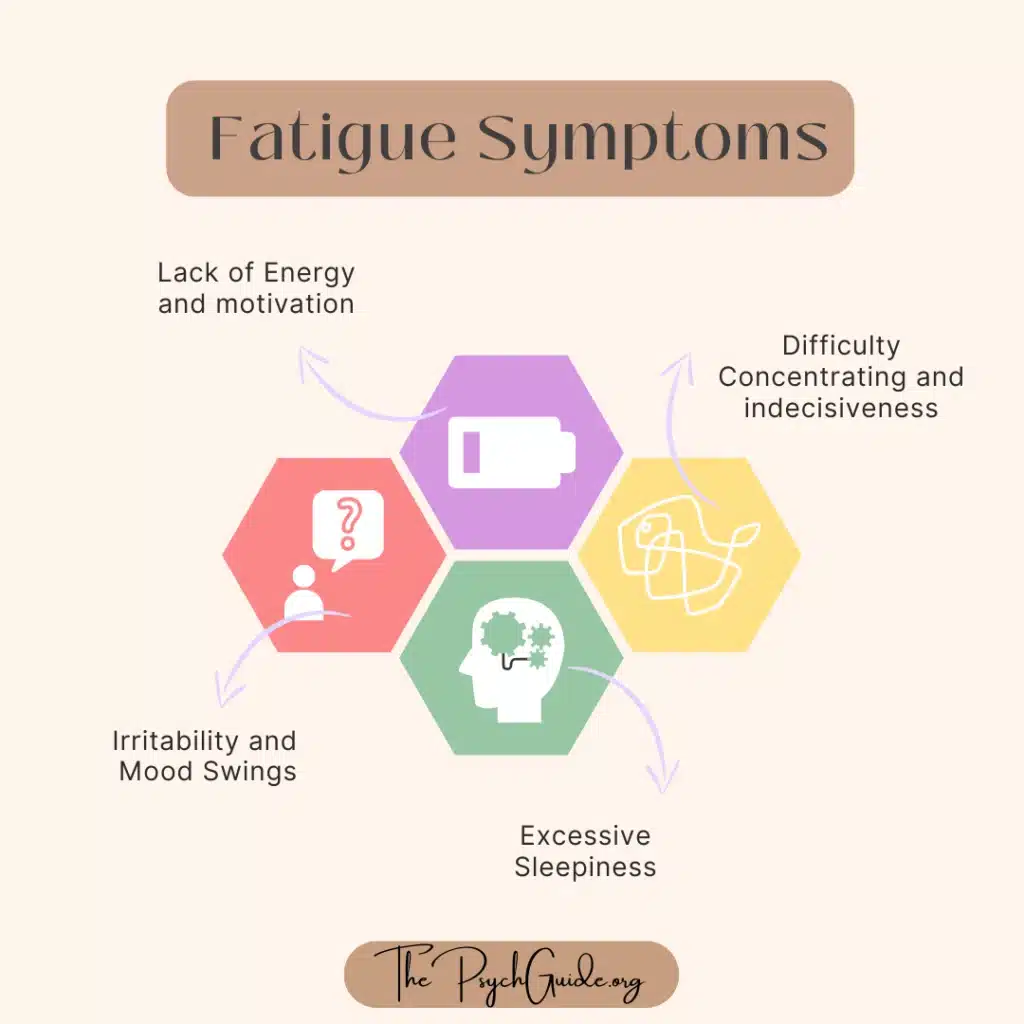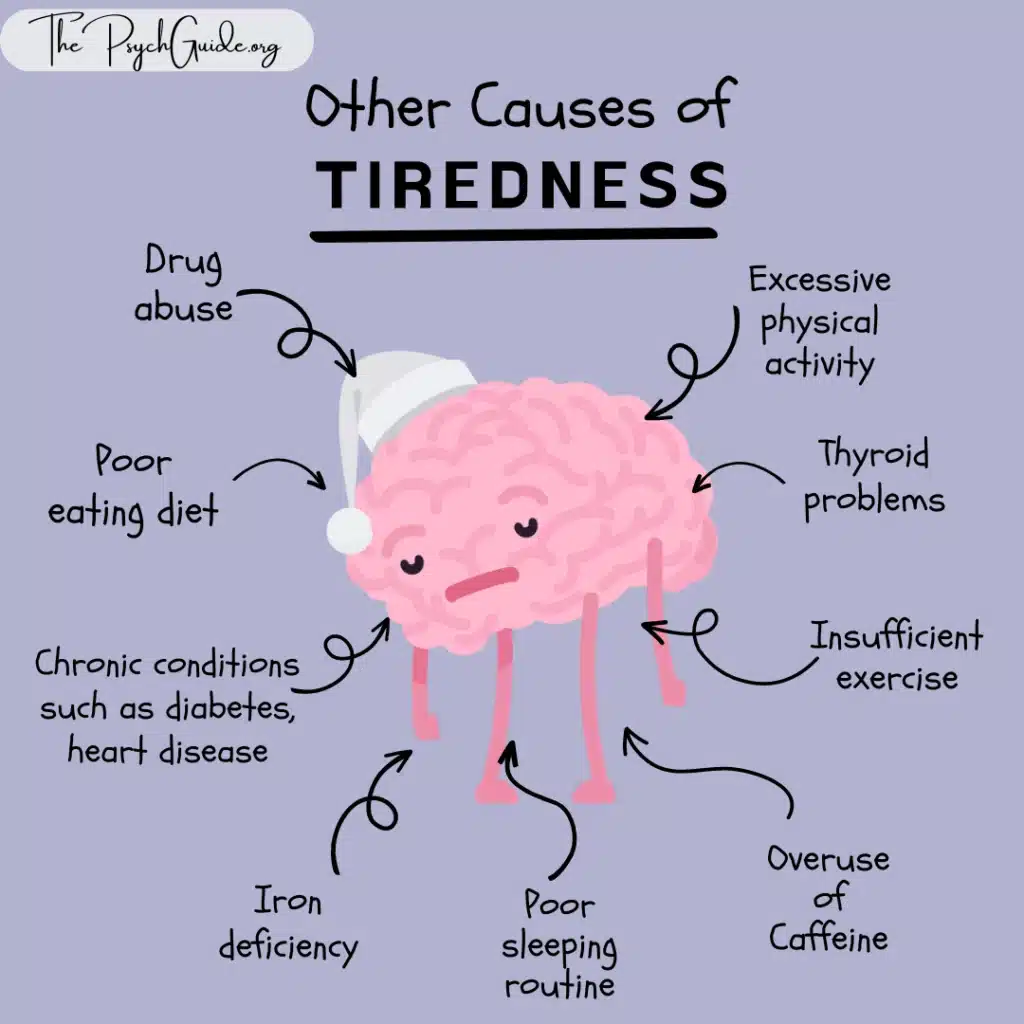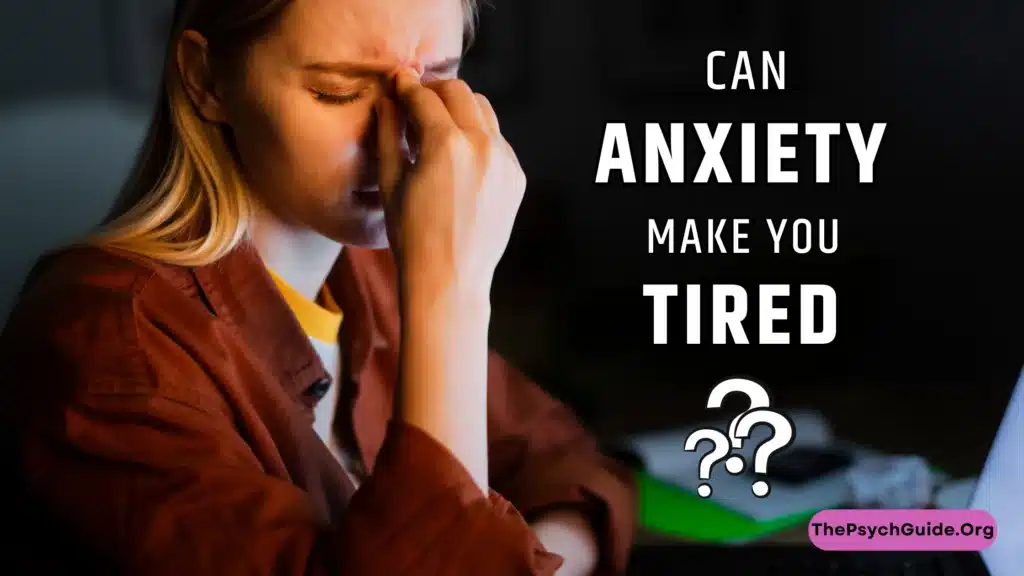In the world of mental health, Anxiety is an overwhelming challenge that can profoundly affect a person’s emotions, thoughts, and behavior. Anxiety has many different symptoms and effects on a person’s health, but among them, the most frequently asked question is, Can Anxiety Cause Tiredness?
Besides being a source of emotional and mental suffering, anxiety is also known for its extramural expression, which is sometimes overlooked. Anxiety has overall many symptoms that affect your mental health but the most common symptom that many individuals suffer from is tiredness.
So, to find out in detail about “Can anxiety cause tiredness?” read this blog post till the end. You will learn about the connection between anxiety and fatigue, the causes behind anxiety fatigue, and the best tips to overcome it. And yeah, don’t miss out on the amazing self-help books that can guide you get through this.
Table of Contents
ToggleAnxiety and its symptoms
Before moving on to our main topic, “Can anxiety cause tiredness?” It’s essential to understand the term anxiety.
Anxiety is the natural human response to stress and danger but when a person regularly feels anxiety then it becomes a mental health disorder. However, in simple words, the feelings of fear, dread, and unease are called anxiety.
The research study by the ADAA states that about 40 million or more Americans aged between 18 and above suffer from an anxiety disorder. But only 36.9% of them receive medical care.
The feeling of anxiety is a normal emotion until it disturbs your daily tasks and routine.
Anxiety Signs
There are many different kinds of anxiety disorders, and each one has its own set of symptoms. Here are some common symptoms of anxiety:

For those who are experiencing anxiety, understanding anxiety and its symptoms can greatly help them improve their quality of life.
Can Anxiety cause Tiredness? Finding connection between Anxiety and Fatigue
After having a brief look at anxiety, let’s move to our highlighted topic: Can anxiety cause tiredness?
Tiredness is also referred to as Fatigue. The condition of being physically or emotionally drained is called fatigue. Headaches, severe agitation, aches in the neck and muscles, and a sleepless night are all signs of tiredness.

The question remains: Can anxiety cause tiredness, or are there other factors contributing to it?
The feeling of being tired sometimes is due to anxiety. The physical effects of anxiety on your body are severe. Anxiety affects your body’s biological structure, which can lead to persistent tiredness and make it difficult for you to get a good night’s sleep.
According to the research, it is proven that there is a significant relationship between anxiety and tiredness. Because of many physical, psychological, and emotional factors, anxiety frequently results in significant fatigue.
Even when a person receives enough sleep, these mental health disorders, such as anxiety and depression, can lead to ongoing tiredness and low energy.
Furthermore, anxiety is a stress response that can lead to long-term activation of the hypothalamic-pituitary-Adrenal (HPA) axis. This prolonged activation can cause HPA axis dysfunction, similar to what is seen in Chronic Fatigue Syndrome (CFS). According to a 2013 study, this dysfunction might contribute to fatigue. So this shows that anxiety can indeed lead to tiredness.
Its important to consider individual differences. As everyone reacts to stress differently, some people might be more prone to fatigue as a symptom of anxiety than others.
Also, severity matters. People with mild anxiety might experience occasional tiredness, while those with severe anxiety disorders may experience chronic fatigue.
However, a 2016 study suggests that anxiety disorders might not be the main culprit behind tiredness for everyone visiting primary care. Depression and other psychosocial factors might be more prominent. However, it’s important to remember that this is just one study, and anxiety can still play a role in fatigue for some people.
There’s also a possibility that fatigue itself can contribute to anxiety. Feeling tired can make you feel overwhelmed and stressed, worsening anxiety symptoms in a vicious cycle. So, which came first, the chicken or the egg? The truth, as often is the case, lies somewhere in between. Anxiety and fatigue can definitely influence each other, but it’s not always a one-way street.
So, Can anxiety cause tiredness? Yes, anxiety can cause fatigue. However, other factors can also contribute to making you tired.
Now let’s examine how anxiety causes tiredness and what the contributing factors are.
Anxiety-related Causes of Fatigue
After knowing that anxiety can lead to tiredness, you might be wondering how anxiety makes you feel tired. Let’s look at some factors that cause tiredness in anxious individuals. It’s normal to feel tired in life, especially if you’re not getting enough sleep, but if you’re anxious, you might feel more tired than usual.
Although fatigue can be caused by a variety of factors, the following list demonstrates how anxiety can lead to tiredness:
1. Mental Tiredness
Mental fatigue can result from an overactive mind caused by constant worry and overanalyzing. Your brain can become fatigued just like any other muscle, so a little of that exhaustion is psychological. Constantly worrying thoughts and an overactive mind are associated with anxiety. It strains your mental faculties, making it harder for you to think and act.
2. Sleep Issues
Anxiety often disrupts sleep, making it hard to fall asleep, stay asleep, or have a restful night. Many people with anxiety struggle to sleep due to racing thoughts, fears, or physical symptoms like tense muscles. This can disturb sleep patterns, leaving you tired and drained during the day. Research shows that sleep directly affects mental health, and anxiety’s impact on sleep is a significant factor leading to fatigue. A 2021 study found that better sleep reduced stress, anxiety, depression, and negative thinking in people.
3. Post- Anxiety Crash
After an anxiety attack, your body experiences a “crash” when the adrenaline that is helping you cope with stress wears off. Adrenaline is a hormone that prepares your body to fight or flee from danger, giving you a burst of energy. Once this hormone depletes, your body feels exhausted and drained, similar to how you might feel after running a race.
4. Muscle tension
Anxiety can cause your muscles to tighten, especially in the shoulders, back, and neck. This constant tension can lead to physical discomfort and fatigue. It’s like carrying a heavy backpack all day; eventually, your muscles get tired and sore.
5. Hormonal Effects
Your body becomes more aroused when you’re feeling anxious, which raises the levels of stress chemicals like cortisol and adrenaline. These hormones can interfere with your sleep, challenging your ability to fall and stay asleep. It’s as if your body is always on high alert, making it difficult to relax and rest properly. As a result, you may experience feelings of tiredness and fatigue during the day.
6. Depression
Sometimes, anxiety can lead to feeling down or even depressed, especially after an anxiety attack. When you’re depressed, it feels like your body’s battery is running low. Even simple tasks can feel exhausting, and it’s hard to stay motivated throughout the day. This lack of energy can make you feel constantly tired.
Other causes of tiredness
Apart from mental health disorders such as depression and anxiety, several other factors can lead to fatigue. Let’s have a look.

Finding and treating these underlying causes of fatigue is often necessary to enhance general well-being and energy.
How to Overcome Anxiety Fatigue?
Treating anxiety and addressing fatigue causes are essential to overcoming anxiety-related exhaustion. Here are a few helpful strategies:
Lifestyle recommendations
- Stay Hydrated
Staying hydrated throughout the day is important because dehydration can exacerbate fatigue. It is generally advised to consume eight glasses (64 ounces) of water a day to stay hydrated and help lower anxiety.
- Eat a Balanced Diet
Eat a diet that is high in fruits, vegetables, whole grains, lean meats, and other nutrients. Avoid sugar and caffeine excess, as these can worsen fatigue and anxiety.
- Engage in Regular Exercise
Regular exercise can enhance your general health and energy levels. Regular exercise improves sleep quality, lowers anxiety, and improves general well-being. For most of these benefits, try to get in at least 30 minutes of moderate exercise most days of the week. Regular exercises include swimming, yoga, or walking.
- Set up relaxation and mindfulness techniques
To relieve stress, practice deep breathing techniques or mindfulness meditation. To relax your mind, try progressive muscle relaxation or visualization.
- Give up smoking
Smoking not only contains a lot of harmful chemicals, but it also reduces energy because blood oxygen levels (which are needed for the body to produce energy) are lowered by the carbon monoxide in cigarette smoke.
Dietary Recommendations
Dietary adjustments can greatly reduce anxiety and increase energy. Following is a list of foods to eat and foods to stay away from:
| What to Eat | Examples | Benefits |
| Complex Carbohydrates | Brown rice, oats, beans, lentils | Provides steady energy, stabilizes blood sugar, supports serotonin production |
| Proteins | Fish, chicken, tofu | Helps repair tissues, provides sustained energy |
| Fruits and Vegetables | Berries, citrus fruits, leafy greens | Rich in vitamins and antioxidants, supports overall health, reduces stress |
| Healthy Fats | Almonds, flaxseeds, chia seeds, olive oil | Supports brain health, provides energy, reduces inflammation |
| What to Avoid | Examples | Reasons to Avoid |
| Sugary Snacks | Cookies, snacks, candies | Causes blood sugar spikes and crashes, can increase anxiety and fatigue |
| High Caffeine Products | Coffee, energy drinks | Can increase anxiety, disrupt sleep, and cause jitteriness |
| High-Fat Foods | Fast food, fried foods | Can contribute to inflammation and negatively impact brain health |
Eat well-balanced meals and snacks every few hours to keep your blood sugar levels consistent. Eat in a comfortable setting and pay attention to your body’s signals of hunger and fullness.
These dietary adjustments can help in reducing anxiety and boosting energy levels. Making conscious food choices plays a significant role in maintaining mental and physical well-being.
Professional Treatments:
Professional treatments for anxiety-related fatigue frequently combine therapy and medication. There are several types of therapies and medicines available that can help you cope with your anxiety-causing tiredness but the following are some of them.
Therapies:
- Cognitive-Behavioral Therapy (CBT): CBT is a very successful anxiety treatment. It assists people in recognizing and altering harmful thought patterns and actions that cause tiredness and anxiety.
- Mindfulness-Based Stress Reduction (MBSR): MBSR involves mindfulness meditation and yoga to reduce stress and improve overall well-being.
- Acceptance and Commitment Therapy (ACT): ACT encourages accepting negative thoughts and feelings rather than fighting them and committing to actions that align with one’s values.
Medication:
- Antidepressants: You can feel happier and have more energy if you take antidepressants. You can control your anxiety symptoms with selective serotonin reuptake inhibitors (SSRIs) or serotonin-norepinephrine reuptake inhibitors (SNRIs), prescribed by your doctor.
- Anxiolytics: Anxiolytics are medications specifically designed to reduce anxiety. Benzodiazepines, such as diazepam and lorazepam, are effective but typically used short-term due to the risk of dependency.
- Stimulants: Stimulants such as armodafinil and modafinil can enhance alertness and energy, especially if fatigue is severe.
By implementing these techniques, therapies, and medications, anxiety and the fatigue it causes can be decreased. It’s crucial to figure out which combination of methods works best for you and to practice self-compassion during this process.
Must-Read Self-Help Books for Anxiety and Tiredness
This book will surely help people who are suffering from any type of anxiety. Before these extremely treatable conditions develop into clinical anxiety disorders, this book will assist you in understanding and overcoming them.
By reading this book you will discover how brain-fueling, high-protein foods help you to permanently overcome your fatigue, anxiety, and worry just by yourself.
It is an inspiring handwritten guide that challenges traditional approaches to anxiety and fatigue, offering a path to reclaim your true self and natural energy by understanding the underlying meaning behind your symptoms.
It is the best book for anyone suffering from anxiety who wants to have some peace and calm in their life. It can help you deal with and cope with your anxiety in just 30 days.
This book will surely help you to recognize, accept, and overcome being tired. It is especially meant for women who are suffering from tiredness.
Conclusions
To sum it up, Can anxiety cause tiredness? Yes, fatigue can be a result of anxiety, which can occur in several different ways. Feelings of tiredness and exhaustion can be linked to the psychological, physical, and emotional effects of anxiety.
The body releases stress hormones like cortisol and adrenaline in reaction to anxiety, and this can interfere with sleep cycles and cause physical exhaustion.
Sometimes, fatigue might have a different cause entirely. Anemia, thyroid problems, or even depression can mimic symptoms of tiredness. It’s important to see a doctor to rule out other medical conditions before jumping to conclusions.
To reduce the effect and control your anxiety on your general well-being, it is vital for you to comprehend the relationship between anxiety and tiredness and use helpful ways to cope.
The factors mentioned above in this blog post can help you deal with anxiety-related fatigue, and medication and counseling are commonly used to treat this kind of anxiety-related tiredness.
After reading this,
- You may also wonder, Can depression make you tired?
Frequently Asked Questions
- Which type of fatigue is caused by constant worry?
Emotional or mental exhaustion is the kind of fatigue brought on by ongoing anxiety. This type of exhaustion is brought on by extended stress and anxiety, which eventually results in mental tiredness.
- Is it normal to feel tired after an anxiety attack?
Indeed, feeling exhausted after an anxiety attack is expected. Feelings of exhaustion may follow an attack because of the body’s high level of arousal during the episode.
- Should I see a doctor if my anxiety is causing severe tiredness?
It is crucial to get medical attention from a healthcare provider if anxiety is making you extremely tired and interfering with your everyday activities.
- What does fatigue from anxiety feel like?
Anxiety-related fatigue often feels like a constant, fatal tiredness that doesn’t go away with rest. Its physical signs and symptoms may include limb heaviness, weakness in the muscles, and a generalized lack of energy. Psychological symptoms could include blurred or slower thinking, difficulty focusing, and overwhelming feelings.

